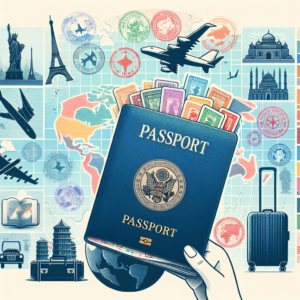Unveiling the Harsh Realities: The Shocking Truth Behind Deportation Cases
[caption id="attachment_37184" align="alignnone" width="607"] Visa Travel[/caption]
In recent years, the topic of deportation has emerged as a focal point in discussions surrounding immigration policy, human rights, and social justice. As nations grapple with the complexities of immigration, the harsh realities faced by individuals caught in the deportation process often remain obscured. This article aims to unveil the shocking truths behind deportation cases, exploring the legal framework, personal stories, systemic issues, the impact of immigration policies, advocacy efforts, and the future of deportation practices.
Understanding Deportation: An Overview of the Legal Framework and Processes
Deportation is a legal process through which individuals are removed from a country due to violations of immigration laws or criminal convictions. In the United States, the deportation process is governed by the Immigration and Nationality Act (INA), which outlines the grounds for removal, including unlawful presence, criminal activity, and failure to comply with visa conditions. The process typically begins with a notice to appear in immigration court, where individuals can contest their deportation. However, the complexities of the legal framework often leave many without adequate representation, leading to a high rate of deportations. The lack of transparency in the system further complicates the situation, as individuals may not fully understand their rights or the implications of their cases.
The Human Impact: Personal Stories Behind Deportation Cases and Their Consequences
Behind the statistics of deportation cases lie personal stories that reveal the profound human impact of these actions. Families are often torn apart, with parents facing separation from their children, who may be U.S. citizens. For instance, the story of Maria, a mother of three who fled violence in her home country, highlights the emotional toll of deportation. After living in the U.S. for over a decade, Maria was apprehended during a routine check and faced imminent deportation. Her children, who rely on her for emotional and financial support, now grapple with anxiety and uncertainty about their future. Such narratives underscore the devastating consequences of deportation, not only for the individuals directly affected but also for their families and communities.
Systemic Issues: Analyzing the Flaws in the Deportation Process and Legal Representation
The deportation process is fraught with systemic issues that hinder fair and just outcomes. One of the most significant flaws is the lack of access to legal representation for many individuals facing deportation. Unlike criminal proceedings, where defendants have the right to an attorney, immigration cases do not guarantee legal counsel, leaving many to navigate the complex legal system alone. This disparity often results in individuals being unable to effectively present their cases, leading to higher rates of deportation. Additionally, the expedited nature of immigration courts, which are often overwhelmed with cases, further exacerbates the problem, as individuals may have limited time to prepare their defenses or appeal decisions.
The Role of Immigration Policies: How Changes Affect Deportation Rates and Outcomes
Immigration policies play a crucial role in shaping deportation rates and outcomes. Recent years have seen significant shifts in policy, with stricter enforcement measures and changes to asylum processes leading to increased deportations. For example, the implementation of the "zero tolerance" policy in 2018 resulted in the separation of thousands of families at the border, drawing widespread condemnation and highlighting the human cost of such policies. Conversely, periods of more lenient policies, such as Deferred Action for Childhood Arrivals (DACA), have provided temporary relief for certain groups, illustrating how policy changes can directly impact the lives of individuals facing deportation. The ongoing debate over immigration reform continues to influence the landscape of deportation, with advocates calling for more humane and just policies.
Advocacy and Reform: Efforts to Address Injustices in the Deportation System
In response to the injustices inherent in the deportation system, numerous advocacy groups and organizations have emerged to champion the rights of individuals facing removal. These organizations work tirelessly to provide legal assistance, raise awareness, and push for policy reforms that prioritize human rights and dignity. Initiatives such as community-based legal clinics and public awareness campaigns aim to educate individuals about their rights and the deportation process. Additionally, advocacy efforts have led to calls for comprehensive immigration reform that addresses the root causes of migration and seeks to create a more equitable system. The collaboration between grassroots organizations, legal experts, and policymakers is essential in driving meaningful change within the deportation landscape.
Looking Ahead: The Future of Deportation Practices and Immigration Reform Initiatives
As the conversation around immigration continues to evolve, the future of deportation practices remains uncertain. Ongoing debates in legislative bodies and the courts will shape the direction of immigration reform initiatives. Advocates are pushing for a more compassionate approach that considers the humanitarian aspects of deportation, emphasizing the need for pathways to legal status and protections for vulnerable populations. The increasing recognition of the human rights implications of deportation may lead to significant changes in policy and practice. However, the outcome will depend on the collective efforts of advocates, lawmakers, and communities to ensure that the voices of those affected by deportation are heard and prioritized in the reform process.
The realities of deportation are complex and multifaceted, encompassing legal, personal, and systemic dimensions. As we strive to understand and address the injustices within the deportation system, it is crucial to amplify the voices of those affected and advocate for reforms that prioritize human dignity and rights. The path forward requires a commitment to compassion, justice, and a recognition of the shared humanity that transcends borders. Only through collective action and sustained advocacy can we hope to create a more just and equitable immigration system for all.
